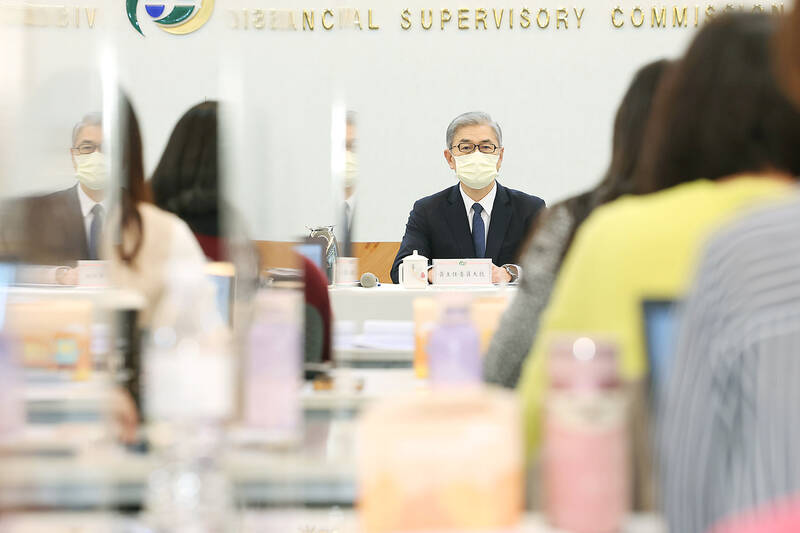Taiwanese financial institutions’ exposure to financially troubled Credit Suisse is not significant, the Financial Supervisory Commission (FSC) said yesterday, amid mounting concerns over the local financial sector’s overseas exposure.
As of the end of January, Taiwan’s banking, insurance and securities industries’ exposure to the Swiss bank totaled NT$157.3 billion (US$5.15 billion), data from the financial regulator showed.
Insurance firms had the largest exposure at NT$108.2 billion, but it represented only 0.35 percent of the sector’s total investable funds, the commission said.

Photo: CNA
The commission did not detail the types of financial instruments held by local financial institutions, but it said Credit Suisse had issued 27 bonds denominated in foreign currencies on the Taipei Exchange.
Those bonds have a current balance of US$2.109 billion, accounting for 1.01 percent of the total bonds in circulation on the Taipei Exchange’s international bond market, with life insurers the main buyers, the commission said.
Credit Suisse on Tuesday said it found “material weakness” in its internal financial reporting controls, as it scrapped bonuses for top executives in the wake of its worst annual performance since the global financial crisis.
The local banking sector’s exposure to Credit Suisse declined late last year, falling to NT$48.9 billion by the end of the year from NT$55.3 billion at the end of October, the commission said.
Its exposure to the Swiss bank accounted for only 0.4 percent of its total overseas exposure of more than NT$12 trillion, the commission said, adding that it would continue to monitor the situation and keep a close eye on the Swiss bank’s financial condition.
The local securities sector’s exposure to Credit Suisse totaled NT$197 million as of the end of last month, accounting for less than 1 percent of the sector’s net worth, the commission said.
At least seven Taiwanese banks serve as sales agents for Credit Suisse’s financial products, the regulator said.
As of the end of December last year, clients of those banks owned NT$67.4 billion in financial bonds and structured financial products sold by Credit Suisse, down NT$25.1 billion from the end of October, the commission said.
The seven local banks that sold Credit Suisse’s products have risk control measures in place, and if their clients want to redeem their investments, those banks were not likely to suffer liquidity risks, it said.
In addition, as of the end of last month, local investors had NT$4.63 billion in exposure to Credit Suisse through mutual funds, accounting for 0.13 percent of Taiwanese’s total investment in overseas mutual funds, it said.

The US dollar was trading at NT$29.7 at 10am today on the Taipei Foreign Exchange, as the New Taiwan dollar gained NT$1.364 from the previous close last week. The NT dollar continued to rise today, after surging 3.07 percent on Friday. After opening at NT$30.91, the NT dollar gained more than NT$1 in just 15 minutes, briefly passing the NT$30 mark. Before the US Department of the Treasury's semi-annual currency report came out, expectations that the NT dollar would keep rising were already building. The NT dollar on Friday closed at NT$31.064, up by NT$0.953 — a 3.07 percent single-day gain. Today,

‘SHORT TERM’: The local currency would likely remain strong in the near term, driven by anticipated US trade pressure, capital inflows and expectations of a US Fed rate cut The US dollar is expected to fall below NT$30 in the near term, as traders anticipate increased pressure from Washington for Taiwan to allow the New Taiwan dollar to appreciate, Cathay United Bank (國泰世華銀行) chief economist Lin Chi-chao (林啟超) said. Following a sharp drop in the greenback against the NT dollar on Friday, Lin told the Central News Agency that the local currency is likely to remain strong in the short term, driven in part by market psychology surrounding anticipated US policy pressure. On Friday, the US dollar fell NT$0.953, or 3.07 percent, closing at NT$31.064 — its lowest level since Jan.

The New Taiwan dollar and Taiwanese stocks surged on signs that trade tensions between the world’s top two economies might start easing and as US tech earnings boosted the outlook of the nation’s semiconductor exports. The NT dollar strengthened as much as 3.8 percent versus the US dollar to 30.815, the biggest intraday gain since January 2011, closing at NT$31.064. The benchmark TAIEX jumped 2.73 percent to outperform the region’s equity gauges. Outlook for global trade improved after China said it is assessing possible trade talks with the US, providing a boost for the nation’s currency and shares. As the NT dollar

The Financial Supervisory Commission (FSC) yesterday met with some of the nation’s largest insurance companies as a skyrocketing New Taiwan dollar piles pressure on their hundreds of billions of dollars in US bond investments. The commission has asked some life insurance firms, among the biggest Asian holders of US debt, to discuss how the rapidly strengthening NT dollar has impacted their operations, people familiar with the matter said. The meeting took place as the NT dollar jumped as much as 5 percent yesterday, its biggest intraday gain in more than three decades. The local currency surged as exporters rushed to